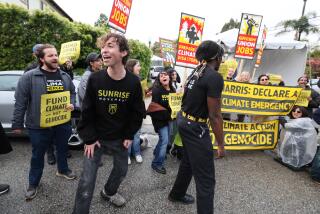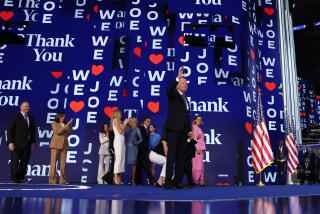Finally Coming In From the ‘Cool’
- Share via
The times they have a-changed for Haskell Wexler. In 1968, the Oscar-winning cinematographer and director was in Chicago as an outsider, filming a movie against the backdrop of the city’s preparations for the Democratic National Convention. Cast and crew were apparent targets of police harassment and were caught up in the maelstrom of the clash between protesters and police.
Twenty-eight years later, Wexler has returned to his hometown for the 1996 convention, but this time as an invited guest. He will spend a much more tranquil August night editing footage he is shooting for ABC News’ “Nightline.” He wears around his neck official press credentials that will allow the onetime outsider access to the inside.
A winner of the 1976 Academy Award for cinematography for “Bound for Glory,” Wexler, 74, has a long list of credits. Among his recent work was the filming of John Sayles’ “The Secret of Roan Inish.” Wexler’s assignment for “Nightline” evolved from an invitation from a local movie theater to attend screenings of his seminal 1969 film, “Medium Cool,” and to answer questions from the audience. In the film, Wexler’s directorial debut, a cameraman portrayed by Robert Forster must wrestle with being a disinterested observer or becoming emotionally involved with what he sees through his lens.
“Nightline” was initially interested in the anticipated dialogue between Wexler and other veterans of the 1968 convention and those who were children or not yet born at the time. The ABC show then decided to ask Wexler to take his own camera throughout the city to explore the contrasts between Chicago, 1968, and the city today, and to interview this convention’s voices of protest.
What a difference nearly three decades makes. A special area has been cordoned off for those who want their causes to be heard. Thus far, one of the few reported confrontations has occurred at the Hilton & Towers on Michigan Avenue between police and marchers who wanted to use the hotel’s restrooms for lack of an adequate number of portable toilets.
“I wanted to see the differences,” Wexler said during a break before editing. “I’m curious to know if the lessons of 1968 were learned. What is presented to the American people is the violence (that occurred) in ‘68, the superficial action things that sell television.”
One obvious lesson, he said, “is that everyone is intent on having a peaceful [convention]. It is very encouraging. I’ve seen a tremendously overt attempt to be sane. The thing about ’68 was insanity. There’s a scene in ‘Medium Cool’ in which a young man walks by with a sign that says, ‘Sanity, please.’ If anything summarizes what I was feeling at that time it is that sign.”
Wexler has already sought out “people I know,” including authors Studs Turkel and Larry Heinemann (who in 1968 had just returned to the city from the Vietnam War and was driving a bus), activist and comedian Dick Gregory and health care advocate Dr. Quentin Young. He is also scheduled to interview a former Chicago policeman he mentioned only as Gus who is now captain of a small boat on the Chicago River.
He has spoken with young people, as well, who are vaguely aware of the 1968 riots and who told Wexler they believed the protesters “could have done it in a nicer way.”
Inside the convention hall, Wexler will train his cameras “backstage” in response to what promises to be as controlled a convention as was the Republicans’ in San Diego. “We have a show called a convention,” he said. “Writers have been working for weeks on stuff that is typed onto TelePrompTers. The politicians no longer just [practice] in front of a video camera. They [take direction from coaches]. “It’s all a movie and we’re here to make the movie. What the public doesn’t see and what I’m going to try and show is the other side of the TelePrompTers. I don’t have high hopes that what I’m doing for “Nightline” will be anything of any world-shaking or dramatic importance. It seems like Ted Koppel was [angry] enough about the manufactured aspects of the Republican convention that he may be interested in the material we’re giving him.”
Like “Medium Cool,” Koppel’s and “Nightline’s” sudden departure in mid-Republican convention focused debate on the media’s role and responsibility in reporting the news.
Because of the show’s format, the conventions have presented producers with unprecedented challenges. Both parties, said “Nightline” executive producer Tom Bettag, “have been refreshingly candid that their job is to keep from having any news [at the conventions]. On Monday we’re going to have the phenomenon of a convention broadcast that doesn’t have a single politician speaking during it. Trying to come behind that and do an analysis of the hour you’ve just seen is a little tough.”
“Nightline,” he said, “will instead explore issues related to the convention without being married to what is the news lead on the broadcast that came ahead of us.”
For his part, Wexler hopes to recapture some of the passion of an earlier era. He said he noticed in young people a strong sense of apathy, powerlessness and cynicism. “People in 1968 were alive and interested and ready to fight and argue for the democratic process,” he said. “There’s nothing worse for democracy than when there is withdrawal.”
* “Nightline” will be shown on ABC following the convention at 11:35 p.m. Wexler’s footage will be scheduled as it becomes available.
More to Read
Only good movies
Get the Indie Focus newsletter, Mark Olsen's weekly guide to the world of cinema.
You may occasionally receive promotional content from the Los Angeles Times.










